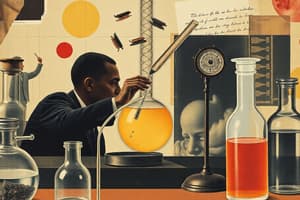Podcast
Questions and Answers
What is the primary focus of Chemistry within the Physical Sciences?
What is the primary focus of Chemistry within the Physical Sciences?
- Study of fundamental forces
- Study of matter and energy
- Study of substances and their properties (correct)
- Study of Earth's processes
In the scientific method, which step involves forming a testable explanation?
In the scientific method, which step involves forming a testable explanation?
- Analysis
- Hypothesis (correct)
- Conclusion
- Observation
Which branch of science focuses on the study of society and social behavior?
Which branch of science focuses on the study of society and social behavior?
- Psychology
- Biology
- Sociology (correct)
- Economics
What distinguishes a scientific theory from a scientific law?
What distinguishes a scientific theory from a scientific law?
What is the role of an independent variable in an experiment?
What is the role of an independent variable in an experiment?
Which of the following best describes the importance of science in society?
Which of the following best describes the importance of science in society?
What is one current trend in scientific research?
What is one current trend in scientific research?
Which aspect of sustainability is a primary focus in current scientific trends?
Which aspect of sustainability is a primary focus in current scientific trends?
Flashcards are hidden until you start studying
Study Notes
Definition
- Science is a systematic enterprise that builds and organizes knowledge in the form of testable explanations and predictions about the universe.
Branches of Science
-
Physical Sciences
- Physics: Study of matter, energy, and the fundamental forces.
- Chemistry: Study of substances, their properties, and reactions.
- Earth Science: Study of the Earth, its structure, processes, and history.
-
Life Sciences
- Biology: Study of living organisms, their structure, function, growth, and evolution.
- Zoology: Study of animals and their behaviors.
- Botany: Study of plants.
-
Social Sciences
- Psychology: Study of mind and behavior.
- Sociology: Study of society and social behavior.
- Economics: Study of the production, distribution, and consumption of goods and services.
Scientific Method
- Observation: Noticing and describing phenomena.
- Question: Asking a question about the observations.
- Hypothesis: Formulating a testable explanation.
- Experimentation: Testing the hypothesis through controlled experiments.
- Analysis: Analyzing data to determine whether it supports the hypothesis.
- Conclusion: Drawing conclusions based on the analysis.
- Communication: Sharing findings with the scientific community.
Key Concepts
-
Theory vs. Law:
- Theory: A well-substantiated explanation of an aspect of the natural world.
- Law: A statement based on repeated experimental observations that describe an aspect of the world.
-
Variables:
- Independent Variable: The variable that is manipulated in an experiment.
- Dependent Variable: The variable that is measured or affected in an experiment.
-
Control: A standard for comparison that remains unchanged throughout the experiment.
Importance of Science
- Advances technology and medicine.
- Informs public policy and environmental conservation.
- Drives education and promotes critical thinking.
- Enhances understanding of natural phenomena.
Current Trends
- Interdisciplinary research: Combine methods and perspectives from different scientific disciplines.
- Artificial Intelligence and data science: Transforming analysis and research capabilities.
- Sustainability: Focus on renewable energy, climate change, and conservation science.
Science: A Systematic Pursuit of Knowledge
- Science involves systematically building and organizing knowledge through testable explanations and predictions about the universe.
Branches of Science: A Diverse Landscape
- Physical Sciences delve into the fundamental forces, properties, and structures of the universe.
- Physics focuses on matter, energy, and their interactions.
- Chemistry explores substances, their properties, and reactions.
- Earth Science investigates the Earth's structure, processes, and history.
- Life Sciences explore the intricacies of living organisms.
- Biology studies the structure, function, growth, and evolution of life.
- Zoology focuses on the study of animals and their behaviors.
- Botany investigates the world of plants.
- Social Sciences examine human behavior and societal dynamics.
- Psychology explores the mind and behavior.
- Sociology investigates social structures and behaviors.
- Economics analyzes the production, distribution, and consumption of goods and services.
The Scientific Method: A Foundation for Discovery
- The scientific method provides a framework for exploring the natural world.
- Observation involves noticing and describing phenomena.
- Question arises from observations, prompting further investigation.
- Hypothesis proposes a testable explanation for the observed phenomenon.
- Experimentation involves controlled tests to validate or refute the hypothesis.
- Analysis involves examining data to draw conclusions about the hypothesis.
- Conclusion summarizes the findings based on data analysis.
- Communication shares findings with the scientific community for further research and review.
Science's Key Concepts: Understanding the Language
- Theory vs. Law represent different levels of scientific understanding.
- Theory is a well-substantiated explanation of an aspect of the natural world, supported by extensive evidence.
- Law is a statement based on repeated observations that describes a consistent pattern in nature.
- Variables are crucial elements in experiments.
- Independent Variable is the factor manipulated during an experiment to observe its effect.
- Dependent Variable is the factor measured or observed in response to changes in the independent variable.
- Control serves as a standard for comparison, remaining unchanged throughout the experiment, providing a baseline for analysis.
The Importance of Science: Impact on the World
- Science drives technological advancements and medical breakthroughs.
- Science informs public policies and environmental conservation efforts.
- Science fosters education and promotes critical thinking skills.
- Science enhances human understanding of natural phenomena and the world around us.
Current Trends in Science: Shaping the Future
- Interdisciplinary Research combines methods and perspectives from various scientific disciplines to address complex challenges.
- Artificial Intelligence (AI) and Data Science are transforming research methods, enabling more sophisticated analysis and discovery.
- Sustainability is a central focus, driving research into renewable energy, climate change, and conservation science.
Studying That Suits You
Use AI to generate personalized quizzes and flashcards to suit your learning preferences.




